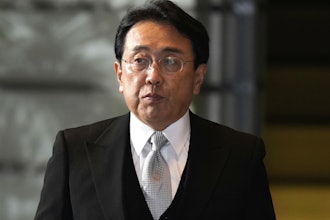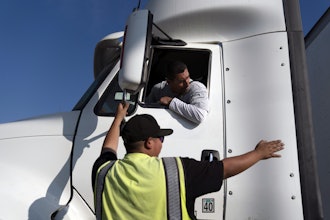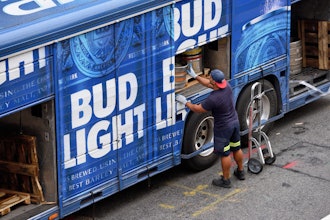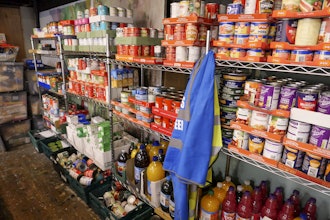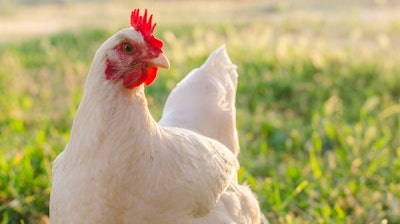
LONDON — On March 30, the Business Benchmark on Farm Animal Welfare (BBFAW)— a leading global measure of policy commitment, performance and disclosure on animal welfare in food companies — launched its ninth annual report, which offers a deep dive into the management and reporting of farm animal welfare practices by the world’s leading food companies in 2020.
The 2020 Benchmark, supported by Compassion in World Farming and World Animal Protection, paints a global picture of corporate animal welfare practices, with analysis of 150 of the biggest names in the food industry.
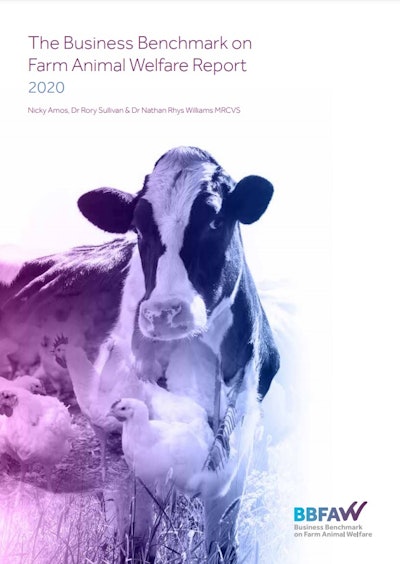
- KraftHeinz moved into Tier 3 and Papa John’s Pizza into Tier 4, both up one tier since last year’s assessment. Other US-based companies BJ’s Wholesale, Cooke Seafood, Mars, and US Foods also moved up one tier — however, these companies moved from bottom-most Tier 6 into Tier 5, indicating that a significant amount of work remains for these companies to improve their management of farmed animal welfare.
- CKE Restaurants, parent company of restaurant chains Hardee’s and Carl’s Jr., plummeted to Tier 6 after the removal of their animal welfare policy from the public domain, which included their public commitment to sourcing 100% cage-free eggs.
- Several other US companies moved down at least one tier since the year prior, including Aramark, Chipotle Mexican Grill, General Mills, Perdue Farms, Publix Super Markets, Subway, and UNFI. Many of these drops reflect a key change in this year’s BBFAW methodology, which added increased weight to public impact reporting — a change intended to emphasize the importance of policies translating into meaningful action. In large part, US-based companies remain in the bottom two tiers.
Global trends illuminated by this year’s report include:
- Despite pandemic-related challenges, company reporting on progress towards 100% cage-free egg supplies is on the rise—61% of BBFAW-analyzed companies reported on that metric this year. However, progress towards other key animal welfare goals, like the transition to lower stocking densities for chickens raised for meat or the elimination of pig gestation crates, remains largely unreported.
- For the first time in BBFAW history, food producers and manufacturers now represent the highest scoring industry sector on farm animal welfare, with an overall average score of 38%.
- Further, food producers and manufacturers are now the most represented sector in Tiers 1 and 2 of the Benchmark: Barilla, Cargill, Cranswick, Danish Crown, Groupe Danone, Fonterra, Hilton Food Group, Marfrig Global Foods, Nestlé, Noble Foods, Premier Foods, and Unilever are all displaying leadership on animal welfare.
- However, over a third (39%) of the companies covered by the BBFAW remain in the bottom two tiers, offering little or no information on their approach to farm animal welfare. In fact, 31 global food companies still lack an overarching farm animal welfare policy.
- Regionally, this year’s report shows that momentum is building in Latin America and Asia Pacific, two regions that include some of the biggest names in global meat production.
Philip Lymbery, Global CEO at Compassion in World Farming International, said:
"This is the ninth annual BBFAW report and I’d like to thank our co-sponsors, World Animal Protection, for sharing the journey with us since 2012, during which time we have seen extraordinary company progress.The current pandemic has been deeply challenging for everyone, particularly for the hospitality sector, and at the same time, has underlined the need for progressive change toward healthier, more resilient, animal-welfare friendly food systems. The need to convert effective policies into practice has never been more urgent.As the 2020 Benchmark demonstrates, giving greater weight to the implementation of progressive practices has become a key corporate performance indicator on animal welfare and thereby health, which will remain important going forward."
Nicky Amos, Executive Director of the Business Benchmark on Farm Animal Welfare, said:
"The 2020 findings show how BBFAW is driving corporate action on farm animal welfare, with around two-thirds of companies actively managing the business risks and opportunities associated with farm animal welfare, and 79% of companies having committed to improvement objectives and targets linked to farm animal welfare. The progress made by companies on managing farm animal welfare since the BBFAW’s inception in 2012 is remarkable and should be applauded. However, as BBFAW enters its tenth year, our expectation is that companies need to demonstrate how their management commitments are translating into improved welfare impacts for animals on the ground."
Explore the full report at bbfaw.com.









